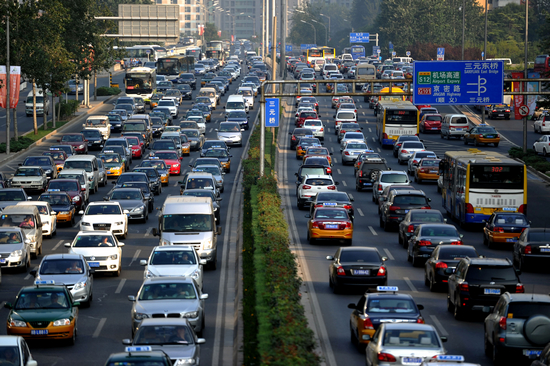Air quality law deletes restrictions on vehicles
 0 Comment(s)
0 Comment(s) Print
Print E-mail Xinhua, August 25, 2015
E-mail Xinhua, August 25, 2015
 |
|
China's newest air pollution draft law no longer contains clauses allowing local governments to restrict or ban vehicles to fight air pollution. [File photo] |
China's newest air pollution draft law no longer contains clauses allowing local governments to restrict or ban vehicles to fight air pollution, China's top legislature noted yesterday.
The first draft of the Air Pollution Control Law allowed local governments to restrict or ban vehicles in specified areas and during specified times. The second draft adds a clause that said restrictions should consider public opinion.
The clauses were deleted after lawmakers and members of the public argued that the restrictions were related to citizens' rights to property.
It is up to local legislatures to decide whether a driving ban will be adopted in their jurisdiction, and driving restrictions will only be provided in local legislation based on actual need, according to the report.
In a bid to control smog, Chinese cities have begun to restrict the use of vehicles. In Beijing, vehicles are restricted one out of five weekdays based on plate numbers.
Half of its cars are currently off the road due to restrictions imposed on August 20. Cars will be allowed on the road on alternate days according to their plate numbers to clear the air ahead of the IAAF track and field world championships and the September 3 military parade.
The draft amendment also adds a slew of new restrictions and requirements to clean up air.
With China's gasoline standards lower than those of automobile exhausts, the draft amendment proposes a gasoline quality standard be established and matched with restriction requirements for major pollutants.
The new amendment adds a clause saying the country should promote clean and efficient use of coal and also calls on local governments to ban low quality coal for residential use.
The previous draft authorized governments above county level to examine vehicle exhausts in parking lots. The current version adds that vehicles on the street may also be tested for pollution through remote sensing and other technologies.
Air quality in coastal areas is influenced by ships, and the current version proposes a control area for pollutant discharge. Ships entering such areas must conform to emission requirements.






Go to Forum >>0 Comment(s)